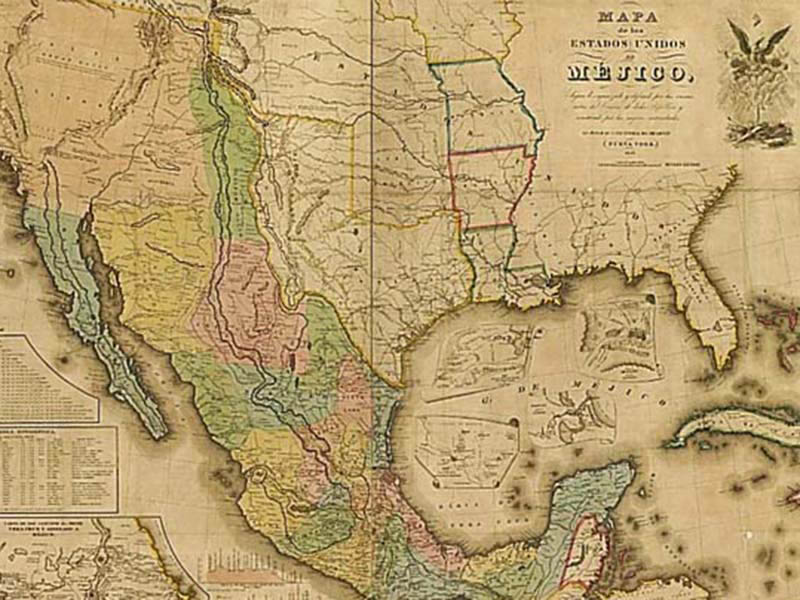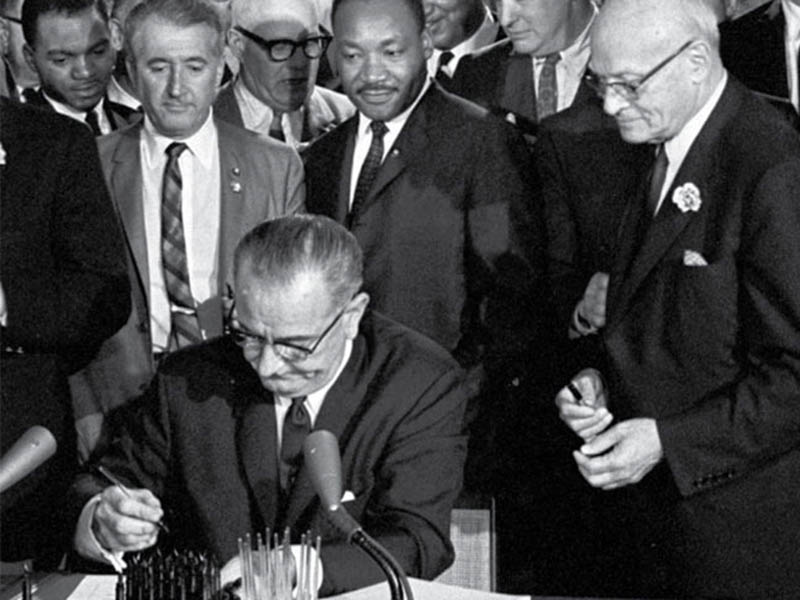Do You Have To Register To Vote In Every State
Who got the right to vote when?
A history of voting rights in America.
Updated: August 18, 2020
August eighteen, 2020 marks 100 years since the ratification of the 19th Subpoena to the United States Constitution granting women the right to vote.
All the same, obstacles like poll taxes, literacy tests and other discriminatory country voting laws would keep Blackness women (and men) disenfranchised for a further 45 years, until the Voting Rights Human action was signed into police force on August vi, 1965.
The boxing for women's suffrage had begun much earlier, when, in 1848, participants at the first women'due south rights convention at Seneca Falls in New York narrowly passed a resolution that women should seek the right to vote.
Able to vote:
White property owners Virtually women Men without belongings Most African Americans

1787
No federal voting standard - states decide who can vote
Usa Constitution adopted. Because there is no agreement on a national standard for voting rights, states are given the power to regulate their own voting laws. In most cases, voting remains in the easily of white male landowners.

1790
Just white men can become citizens, vote
1790 Naturalization Law passed. It explicitly states that only "free white" immigrants can go naturalised citizens.
1792
No demand to ain belongings in New Hampshire
New Hampshire becomes the get-go country to eliminate its holding requirements, thereby extending the correct to vote to about all free white men.
Able to vote:
White male property owners All Women About African Americans
1807
New Bailiwick of jersey women banned from voting
New Jersey, where some women and African Americans had been permitted to vote since 1776, changed its laws to allow only taxation-paying, white male citizens the correct to vote.

1828
Religion no effect
Maryland becomes the last land to remove religious restrictions when it passes legislation enfranchising Jews. White men can no longer be denied the right to vote on the basis of their religion.

1848
Anti-slavery and women's right activists unite
Women's rights convention held in Seneca Falls, New York. Newspaper editor and abolitionist Frederick Douglass attends and gives a speech supporting universal voting rights, which helps convince the convention to prefer a resolution calling for women'south suffrage.

1848
Citizenship granted, only voting denied
The Treaty of Guadalupe-Hidalgo ends the Mexican-American War and guarantees U.s.a. citizenship to Mexicans living in the territories conquered by the US. However, English linguistic communication requirements and fierce intimidation limit access to voting rights.
Able to vote:
All White men All Women Most African Americans
1856
All states allows all white men to vote
North Carolina is the terminal state to remove property buying equally a requirement to vote.

1868
Old slaves granted citizenship
14th Subpoena to the US Constitution passed. Citizenship is defined and granted to former slaves. Voters, however, are explicitly defined as male. Although the amendment forbids states from denying any rights of citizenship, voting regulation is all the same left in the hands of us.
Able to vote:
White men Some African American men All Women
1870
Vote cannot be denied considering of race, explicitly - so other discriminatory tactics used
15th Amendment passed. It states that the right to vote cannot be denied by the federal or state governments based on race. Nonetheless, soon after, some states begin to enact measures such as voting taxes and literacy tests that restrict the actual power of African Americans to register to vote. Violence and other intimidation tactics are also used.

1872
Women endeavour to vote
Social reformer and women'south rights activist Susan B Anthony is arrested and brought to trial in Rochester, New York for attempting to vote in a presidential ballot. At the same time, Sojourner Truth, a formerly enslaved woman and advocate for justice and equality, appears at a polling booth in Thou Rapids, Michigan, demanding a ballot. She is turned abroad.
Able to vote:
White men Some African American men All Women Native Americans
1876
Indigenous people cannot vote
The Supreme Court rules that Native Americans are not citizens equally defined past the 14th Amendment and, thus, cannot vote.

1882
Chinese cannot be American
The Chinese Exclusion Act bars people of Chinese ancestry from naturalising to get United states citizens.

1887
Assimilation = Right to Vote
Dawes Act passed. It grants citizenship to Native Americans who surrender their tribal affiliations.
1890
Wyoming legislates female person suffrage
Wyoming admitted to statehood and becomes offset country to legislate voting for women in its constitution.

1890
Indigenous people must apply for citizenship
The Indian Naturalization Act grants citizenship to Native Americans whose applications are approved - similar to the procedure of immigrant naturalisation.

1912-13
Women march for voting rights
Women atomic number 82 voting rights marches through New York and Washington, DC.

1919
Military Service = Citizenship for Native Americans
Native Americans who served in the military during Globe War I are granted Usa citizenship.
Able to vote:
White men White women Some African Americans
1920
Right to vote extended to women
19th Amendment passed, giving women the right to vote in both state and federal elections.

1922
Asian ≠ White ≠ Denizen
Supreme Courtroom rules that people of Japanese heritage are ineligible to become naturalised citizens. In the next year, the court finds that "Asian Indians" are also not eligible to naturalise.
Able to vote:
White men White women Some African Americans Native Americans Asians
1924
Again, citizenship granted but voting denied
The Indian Citizenship Deed grants citizenship to Native Americans, only many states nonetheless make laws and policies that prohibit Native Americans from voting.
1926
State violence used to prevent people from exercising their right to vote
While attempting to register to vote in Birmingham, Alabama, a group of African American women are beaten by election officials.
Able to vote:
White men White women Some African Americans Some Native Americans Asians
1947
Legal barriers to Native American voting removed
Miguel Trujillo, a Native American and erstwhile Marine, sues New Mexico for not allowing him to vote. He wins and New Mexico and Arizona are required to give the vote to all Native Americans.
Able to vote:
White men White women Some African Americans Some Native Americans Asians
1952
People with Asian ancestry tin vote
McCarran-Walter Human activity grants all people of Asian ancestry the right to become citizens.

1961
23rd Subpoena passed: Citizens of Washington, DC tin can vote for president
It gives citizens of Washington, DC the correct to vote for the US president. But to this twenty-four hour period, the district's residents - nigh one-half of whom are African-American - still do not take voting representation in Congress.

1963
Voting rights as civil rights
Big-scale efforts in the Due south to register African Americans to vote are intensified. Even so, land officials refuse to allow African Americans to annals past using voting taxes, literacy tests and trigger-happy intimidation. Among the efforts launched is Freedom Summertime, in which nearly a thousand civil rights workers of all races and backgrounds converge on the Southward to support voting rights.
1964
No tax required to vote
24th Subpoena passed. It guarantees that the right to vote in federal elections will not be denied because of failure to pay any tax.
Able to vote:
White men White women African Americans Native Americans Asians
1966
After the legal change, struggle continues for social change
Civil rights activist James Meredith is wounded by a sniper during a solo "Walk Against Fear" voter registration march betwixt Tennessee and Mississippi. The next day, nearly 4,000 African Americans annals to vote. Other civil rights leaders such as Martin Luther King, Jr. and Stokely Carmichael continue the march while Meredith heals. Meredith re-joins the march at its conclusion in Mississippi.
Able to vote:
White men White women African Americans Native Americans Asians Citizens over the age of 18
1975
Voting materials in various languages
Amendments to the Voting Rights Act require that certain voting materials be printed in languages besides English so that people who practise non read English language can participate in the voting process.

1993
Making voter registration easier
National Voter Registration Human activity passed. Intends to increment the number of eligible citizens who register to vote by making registration available at the Department of Motor Vehicles, and public assistance and disabilities agencies.
Able to vote:
White men White women African Americans Native Americans Asians Citizens over the age of eighteen Residents of The states colonies
Able to vote:
White men White women African Americans Native Americans Asians Citizens over the age of 18 Residents of US colonies Felons
2001
Debate - Should voting rights be taken abroad from felons? For how long?
The National Commission on Federal Election Reform recommends that all states allow felons to regain their correct to vote after completing their criminal sentences.
Nearly four million United states of america citizens cannot vote because of past felony convictions. In most states, felons are prohibited from voting while they are in prison or on parole. In some states, peculiarly in the S, a person with a felony confidence is forever prohibited from voting in that state. These laws are a legacy of post-Civil War attempts to prevent African Americans from voting. Ex-felons are largely poor and disproportionately of colour.
2002
Massive voting reform
To solve election inconsistency with more federal voting standards, the Help America Vote Act (HAVA) is passed in response to the disputed 2000 presidential ballot. Massive voting reform effort requires states to comply with a federal mandate for provisional ballots, disability access, centralised, computerised voting lists, electronic voting and the requirement that offset-time voters present identification before voting.
Able to vote:
White men White women African Americans Native Americans Asians Citizens over the age of 18 Overseas troops and expats Residents of U.s. colonies Felons

2013
Office of Voting Rights Act of 1965 struck down
The Supreme Court weakens the constabulary that had ensured federal government oversight of changes to voting systems in states with a history of discriminating against minority voters. Today, voter suppression tactics, including purging voter rolls, imposing strict voter identification laws, limiting the number of polling locations and cutting voting times, effectively deny countless Americans the correct to vote.
Source: https://interactive.aljazeera.com/aje/2016/us-elections-2016-who-can-vote/index.html
Posted by: nobleejew1954.blogspot.com







0 Response to "Do You Have To Register To Vote In Every State"
Post a Comment